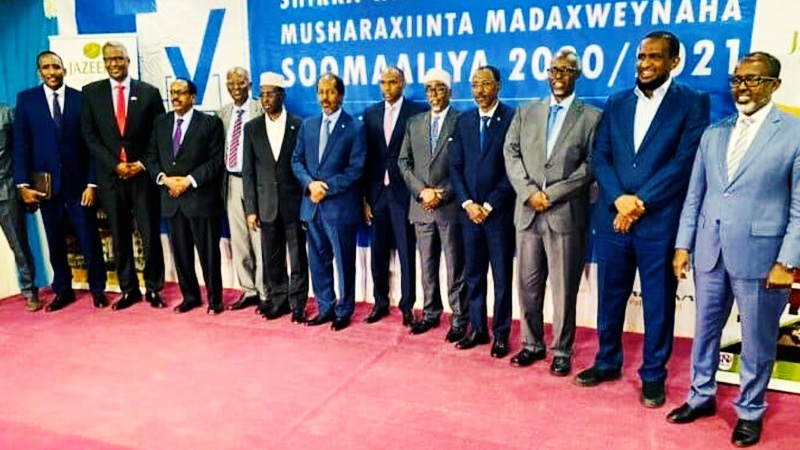MOGADISHU (Somaliguardian) – Somalia’s opposition is considering to hold parallel elections that could bring the war-torn nation to the brink of having two parallel governments based in Mogadishu, while the federal government plays down opposition warnings.
On Saturday, an alliance of opposition presidential candidates announced it had formed a parallel electoral body after the federal government ignored to answer demands for the dissolution of a similar commission appointed by Somali Prime Minister Mohamed Hussein Roble, that is allegedly composed of intelligence agents, state employees and popular supporters of the incumbent leader.
Spokesman for the opposition presidential candidates briefing press said the body would serve to prepare an environment conducive for elections in cooperation with all the Somali political stakeholders.
Somalia’s opposition threatens to take a unilateral action if the current administration fails to answer their demands and insists on calls for the dissolution of the electoral commission previously assigned by the government.
Amid reports that the country’s leader Mohamed Abdullahi Farmajo had invited rival presidential candidates for talks, they highlight that all prospects for a breakthrough have been receded and that the incumbent leader is hell-bent on serving beyond his term.
Somali Information Minister Osman Abokor Dube speaking at a ceremony held in the capital on Sunday, played down opposition warnings and called for end to provocations that could slide the country back to civil, which in his words was “in no one’s interest”.
The opposition also accused Somali government of auctioning deep water offshore oil and gas blocks to fund the reelection campaign of the incumbent leader Mohamed Abdullahi Farmajo, who has not yet officially announced run for second term as president.
Dispute over elections has plummeted relationship between Somalia and Kenya to a new historical low after Mogadishu expelled Kenyan ambassador over what it termed as “polls interference” and summoned back his Somali counterpart.
Kenya’s capital had earlier hosted talks between leaders of opposition parties who sought to unify stance, but Somalia deemed the maneuvers as a conspicuous threat and efforts to pit Nairobi against the Somali opposition came to no avail.
The row reached a grim level last week when Jubaland leader Ahmed Madobe – who enjoys Kenyan support and protection – accused the federal government of delaying elections and reneging on an earlier agreement with regional states that required withdrawal of federal troops from Gedo region and holding election on its due date.
A meeting between opposition leaders continues in Mogadishu for the third week and with no hope of a breakthrough still in sight, presidential candidates willing to run against the current president argue that all avenues were exhausted in pursuit of a fair election and vowed to set up a parallel government if the term of the incumbent leader expires before the country heads to the polls.
Over the past weeks, local media reports suggested that more than 10,000 Somali troops were heading back to the country after completing trainings in Eritrea, whose arrival is feared to further worsen tensions and local agitations in the country.
Djibouti’s President whose troops are part of African Union peacekeepers battling Al-Shabaab in Somalia, added his voice to those pessimistic about the conflict-torn nation’s elections and warned that the outcome might be a parliament controlled by the Al-Qaeda franchise.
The standoff comes as the United States pulls out nearly all its troops from Somalia by mid January next year.
In 1991, two parallel governments separately led by Mohamed Farah Aidid and Ali Mahdi Mohamed had made bases in the capital, Mogadishu and none of them was able to exert authority over the city and the country as a whole that created a power vacuum as a result of which many armed factions sprang up, leading to a civil war that killed tens of thousands and displaced millions of Somalis.
Analysts now warn of a similar prospect as stalemate over elections is feared to slide Somalia back to a civil war, similar to that of 1991 from which the country still struggles to recover.
Contact us: info@somaliguardian.com
